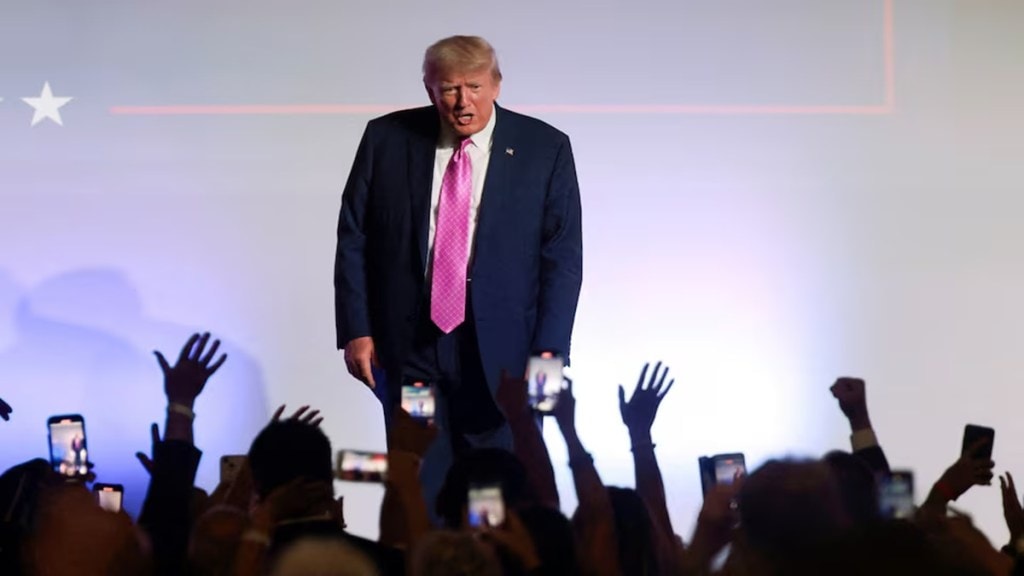By Srinath Sridharan
Donald Trump is crypto’s messiah-in-chief — conflict of interest aside, he has some sweat equity in an upcoming crypto venture too. His newfound cheerleading for crypto is as baffling as it is laughable. Just a few years ago, he dismissed cryptocurrencies as a “scam” and a “threat” to the dollar. This dramatic U-turn feels more like a social media post hastily deleted after realising its unintended implications. Much like a child captivated by a new toy, will this crypto fascination fade once the next shiny object appears?
The irony here is rich. Bitcoin, born out of a dream to eliminate middlemen and even governments’ control of finance, now finds itself embraced by the very intermediaries it sought to bypass. Wall Street, as the representative of all worlds financial, has smartly been not content with making fees off selling stocks, bonds, insurance, debt arrangements, and mutual funds. It has now turned its sights (and political lobbying) on crypto. In its essence, crypto remains what it has always been: a high-stakes gamble driven by retail sentiment, devoid of intrinsic value, and producing no cash flow. Think of it this way: when you invest in a house, you’re betting on its ability to provide shelter or rental income. When you invest in stocks, you’re buying a share in a company’s profits. But when you buy crypto, what exactly are you investing in? A future without banks? A utopia where everyone transacts in blockchain tokens? Or is it simply the hope that someone else will pay more for it than you did?
Financial regulators across the globe have consistently raised alarms about its risks. Crypto’s decentralised nature and opacity make it conducive for illicit activities like money laundering, terrror financing, and tax evasion. Yet, Trump has emboldened the industry to push for a regulatory free-for-all.
Consider the interconnectedness of global markets. In an era where a bank failure in Silicon Valley sends ripples through European markets, adding unregulated crypto assets to the mix is like pouring kerosene on smouldering fire. A single collapse could trigger a domino effect across the global financial system, undermining trust and stability.
Yet, Trump’s return to power promises to accelerate crypto’s mainstreaming. The industry’s lobbyists, emboldened by his support, are pushing for regulatory rollbacks that would make it easier for banks to integrate crypto into their services. This isn’t about innovation or financial inclusion. It’s about creating a fertile ground for profiteering, regardless of the collateral damage.
Crypto deregulation in the US threatens to undo years of progress in banking regulation. Crypto lobbyists are pushing for the rollback of crucial guidelines, including rules that made it costly for banks to offer crypto custody services and required stricter accounting measures for digital assets. Dismantling these safeguards may offer a smoother ride in the short term, but at the cost of a catastrophic plunge.
The stakes couldn’t be higher for global banking regulatory standards. Frameworks like Basel III, designed to ensure the resilience of banks, will be stress-tested like never before if Trump’s crypto agenda takes flight. Crypto’s extreme price volatility, coupled with its speculative nature, could wreak havoc on banks’ capital buffers and liquidity ratios. The integration of such assets without robust global standards risks creating regulatory arbitrage, where bad actors flock to jurisdictions with the weakest rules.
Adding to this circus is David Sacks, Trump’s newly-anointed “crypto-AI czar.” A man who has spent his career criticising tech regulation, Sacks seems an odd choice, given his lack of expertise in either crypto or artificial intelligence. Then again, Trump has never been one to let qualifications get in the way of appointments.
Even after 15 years of existence, crypto still struggles to justify its place in the world. It has no social purpose, economic value, and track record of improving lives. The industry’s relentless marketing machine spins tales of overnight millionaires, preying on the “fear of missing out” to lure in unsuspecting retail investors. Meanwhile, the financial sector rakes in fees by peddling crypto products that are little more than sophisticated gambling tokens. If this house of cards collapses, the fallout could dwarf the global financial crisis. And, as always, the common citizen will bear the brunt.
Regulators must hold their ground, resisting the call of deregulation and ensuring that crypto’s integration into the financial system is guided by prudence, not populism. To quote the Financial Stability Board: “The absence of regulation is not neutrality; it is a licence for instability.” Luckily, the Reserve Bank of India has been holding on to its firm views about crypto. But will the political dispensation accommodate Trump’s crypto tantrums, say via non-financial regulatory frameworks?
The current crypto narrative is almost Dostoevskyan in its absurdity, a tale of human greed and moral bankruptcy disguised as innovation. But unlike Dostoevsky’s characters, who grapple with guilt and redemption, the crypto industry and its political champions seem utterly devoid of it. If Trump’s crypto flip-flop teaches us anything, it’s this: when opportunism and populism collide, the result is a spectacle — entertaining, yes, but also dangerously untethered from reality. And as history has shown, such spectacles rarely end well.
The writer is corporate advisor & independent director on corporate boards.
Disclaimer: Views expressed are personal and do not reflect the official position or policy of FinancialExpress.com. Reproducing this content without permission is prohibited.


